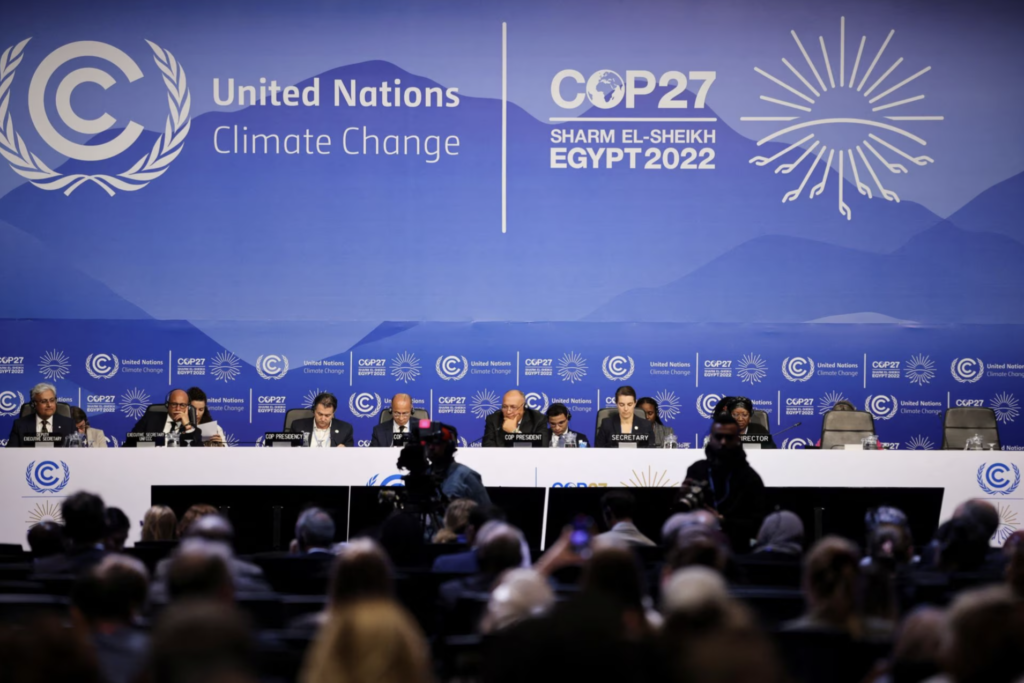‘Loss and Damage’ Was the Focus of COP27. Don’t Expect Climate Finance To Change Anytime Soon!
While it is fair to label this international agreement as a win for global climate politics, calling into question the basis of the agreement and its prospective outcomes is crucial.

Image Credit: Mohamed Abd El Ghany/Reuters
The 2022 United Nations Climate Change Conference, colloquially known as COP27, took place between November 6 and November 18, 2022. The annual conference serves as a global stage for state leaders to meet and, hopefully, progress international agreements on addressing issues regarding climate change. COP meetings tend to produce significant media buzz, and COP27 gained notable attention for its inclusion of what is referred to as “loss and damage” in the final agenda.
The “loss and damage” fund agreement is a form of climate finance designed to redistribute money from wealthier countries to those with less wealth, with the aim of helping fund projects which will reduce emissions in these countries in the long term. This climate finance proposal was largely spearheaded by the EU, but would also require greater funding commitments from China and the United States. The hope is that a loss and damage fund will support the development of finance, technology, and capacity for environmental sustainability in developing countries. As a result, the most notable outcome of COP27 was that transnational climate finance is now on the agenda as an intergovernmental goal in regard to international climate policies.
Climate finance is a broad term that generally refers to funding intended to support the mitigation of, and adaptation to, climate change. This financing can be drawn from a variety of sources, such as public and private funds, which may come from local, national, and transnational political levels. In the days following the conference, the outcome was labeled as a major win, given that it would distribute funds to the most vulnerable countries and communities. Yet commentaries in major news sources, such as The Economist, also debated whether richer countries should pay poorer countries for climate damage through the loss and damage fund, and questioned whether leaders from richer countries would find the funds at a time of gloomy global economic outlook. While it is fair to label this international agreement as a win for global climate politics, calling into question the basis of the agreement and its prospective outcomes is crucial.
Most importantly, the aims of a loss and damage fund, and climate finance, more broadly are not unreasonable. Countries should work together to advance policy through agreements designed to mitigate the effects of and adapt to climate change impacts. Redistributive measures presented through the loss and damage fund have the potential to assist countries in addressing rising debt, in part intensified by the effects of climate change, as well as help drive long-term development. Even disregarding the arguably optimistic moral imperative that underscores the loss and damage fund, this agreement demonstrates a desire for international cooperation in addressing climate issues. However, two important factors should be taken into consideration which, unfortunately, show that such cooperation is unlikely to occur in the near future.
First, countries must begin the messy process of determining exactly how much–including at which times and in which increments–countries should make these contributions, and to whom exact contributions will be given. The loss and damage fund currently promises funding equaling $230 million, and the first meeting of the transnational committee is expected to take place by the end of March 2023. This means that months will have passed before the first meeting even occurs. While progress will hopefully be made, this signifies only the start of a more comprehensive framework for distributing funds. The actions behind these promises are difficult to predict until further details regarding funding and distribution are announced. Historical evidence, however, suggests that the pathway from these promises to action will likely fall short of established goals. For example, in 2020 the UN Environment Programme estimated that climate financing pledged to developing countries fell $17 billion short of the $100 billion of total funding pledged in 2009. It is hard to have confidence in fulfilling climate pledges if developing countries spent 11 years waiting for this inadequate result.
Second, one of the greatest concerns is the proper management and distribution of these funds. A significant issue in international politics is that the distribution of humanitarian aid to many regimes results in mismanagement of funds and corruption at the top which leaves those in need unable to receive the benefits of aid. Corruption could then pose a serious hurdle to the use of climate financing. This would result in critical funding, designed to improve lives through climate mitigation and adaptation developments, having little effect in practice. The agreement to establish a loss and damage fund would tragically fail if regimes misuse tens of millions of dollars in international climate finance to benefit the whims of corrupt leaders.
Where, then, does this leave us? It would be too cynical to deem climate finance a useless tool and that no progress was made at COP27. If details of the loss and damage fund are ultimately worked out as rapidly and with as little contention as possible, while reaching communities that are most in need of financing to save lives and improve climate adaptation technologies and strategies, lives could be saved and improved. Yet, any observer of the outcomes should be wary of meaningful change, particularly in the short term. If history is any indicator, meetings will persist, debates over state contributions and their respective recipients will block financing, and final fund allocations will likely land in the hands of those with more selfish intentions.
The negative consequences of climate change are already being seen. These consequences are compounded by the intensification of climate change and the crafting of effective mitigation and adaptation measures. COP27’s loss and damage fund may be historic, but the short-term limitations of this agreement are already apparent, while the feeble progress regarding agreements to phase out fossil fuels suggest significant shortfalls in terms of outcomes. To create better conditions for people around the world, more urgent action is required to truly make progress on addressing climate change.
Dan Ziebarth is a PhD Student in the Department of Political Science at George Washington University. His research interests primarily relate to Climate Politics and Policy, Climate and Environmental Law, Migration Studies, and Comparative Politics. His political science scholarship has appeared in journals including British Politics, Political Studies Review, and Local Government Studies and his legal scholarship has appeared in journals including the Environmental Law Review, Ecology Law Currents, and the Notre Dame Journal of International and Comparative Law Online. In addition to his scholarly research, he is the Editor-in-Chief of the Greater European Journal, associated with the Institute for a Greater Europe, and has been part of the Young Thinkers Initiative at the Centre for European Policy Studies (CEPS).





